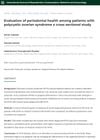227 citations,
November 2004 in “Medicine” Older adults diagnosed with lupus show less severe symptoms but have a lower survival rate, often due to age-related factors.
 89 citations,
June 2012 in “Anais Brasileiros de Dermatologia”
89 citations,
June 2012 in “Anais Brasileiros de Dermatologia” Actinic keratosis can lead to skin cancer, is more common in fair-skinned people, and can be reduced with sunscreen and treated effectively.
44 citations,
September 2020 in “International Journal of Molecular Sciences” New treatments are needed for PCOS that target its genetic, hormonal, and metabolic causes.
 3 citations,
February 2023 in “International Journal of Molecular Sciences”
3 citations,
February 2023 in “International Journal of Molecular Sciences” Autologous Platelet and Extracellular Vesicle-Rich Plasma (PVRP) has potential in enhancing tissue regeneration and improving hair conditions, but its effectiveness varies due to individual differences.
 1 citations,
October 2023 in “Egyptian Journal of Immunology”
1 citations,
October 2023 in “Egyptian Journal of Immunology” PCOS is linked to low-grade chronic inflammation.
 August 2013 in “Fertility and Sterility”
August 2013 in “Fertility and Sterility” High levels of fatty acids are linked to increased androgen production and inflammation in women with PCOS, which may affect IVF outcomes.
 3 citations,
January 2023 in “International Journal of Molecular Sciences”
3 citations,
January 2023 in “International Journal of Molecular Sciences” Heat Shock Proteins are important in the development of Polycystic Ovarian Syndrome and could be targets for new treatments.
 6 citations,
August 2013 in “Fertility and Sterility”
6 citations,
August 2013 in “Fertility and Sterility” Eating cream can increase ovarian androgen production in women with Polycystic Ovary Syndrome, which is not related to obesity.
 5 citations,
March 2015 in “Clinical and Experimental Dermatology”
5 citations,
March 2015 in “Clinical and Experimental Dermatology” Chemotherapy caused a woman's permanent hair loss and early menopause.
 2 citations,
May 2012 in “Annals of Oncology”
2 citations,
May 2012 in “Annals of Oncology” Patients with advanced breast cancer and high hormone receptor levels who had surgery for ovarian/pelvic metastases lived longer, especially if they had high estrogen receptor levels.
 June 2023 in “Journal of multidisciplinary sciences”
June 2023 in “Journal of multidisciplinary sciences” PCOS may increase the risk of certain cancers.
 August 2013 in “Fertility and Sterility”
August 2013 in “Fertility and Sterility” Hair loss is common in women with PCOS and is linked to symptoms like acne and excess hair but not to worse metabolic health.
 3 citations,
January 2019 in “Cureus”
3 citations,
January 2019 in “Cureus” Hormonal imbalances in Polycystic Ovarian Syndrome (PCOS) might trigger a rare skin disorder called Confluent and Reticulated Papillomatosis (CRP), so dermatologists should consider checking for PCOS in CRP patients.
 26 citations,
June 2016 in “Journal of Reproductive Immunology”
26 citations,
June 2016 in “Journal of Reproductive Immunology” Women with PCOS have higher xanthine oxidase activity linked to inflammation and heart disease risks.
 January 2012 in “Yearbook of Dermatology and Dermatologic Surgery”
January 2012 in “Yearbook of Dermatology and Dermatologic Surgery” Studying acne-related syndromes helps us understand acne causes and can lead to new treatments.
 August 2023 in “International Journal For Multidisciplinary Research”
August 2023 in “International Journal For Multidisciplinary Research” Ayurvedic treatment, exercise, and a healthy diet can effectively manage PCOD symptoms.

Early detection and comprehensive treatment of PCOS are crucial due to its long-term health impacts and associated risks.
 August 2020 in “International research journal of pharmacy”
August 2020 in “International research journal of pharmacy” Lifestyle changes and medication can improve the quality of life for women with PCOS by reducing complications.
 May 2024 in “International Journal of Advanced Academic Studies”
May 2024 in “International Journal of Advanced Academic Studies” Vitamin E helps reduce PCOS symptoms and improves hormonal balance.
 September 2023 in “Research Square (Research Square)”
September 2023 in “Research Square (Research Square)” TNC+ fibroblasts play a key role in skin inflammation by interacting with T cells.
 20 citations,
June 2012 in “Human Reproduction”
20 citations,
June 2012 in “Human Reproduction” Women with polycystic ovarian syndrome are more likely to have cervical insufficiency, especially South Asian and Black women.
 4 citations,
July 2019 in “Children (Basel)”
4 citations,
July 2019 in “Children (Basel)” The review concludes that more research is needed to better improve the health outcomes for people with Polycystic Ovarian Syndrome.
 December 2024 in “African Journal of Biomedical Research”
December 2024 in “African Journal of Biomedical Research” Combining lifestyle changes and medication is most effective for managing PCOS symptoms.
 November 2023 in “Curēus”
November 2023 in “Curēus” Eating junk food is linked to higher rates of PCOS and related symptoms in women.
 28 citations,
November 2019 in “Frontiers in Endocrinology”
28 citations,
November 2019 in “Frontiers in Endocrinology” Vegetarian Indian women with PCOS have higher inflammation levels than non-vegetarians.
 1 citations,
December 2021 in “Pakistan biomedical journal”
1 citations,
December 2021 in “Pakistan biomedical journal” Eating certain seeds may help reduce symptoms of Polycystic Ovary Syndrome.
 17 citations,
July 2015 in “Biomolecules and Biomedicine”
17 citations,
July 2015 in “Biomolecules and Biomedicine” High Nesfatin-1 and low Vitamin D may increase blood pressure and heart rate in women with PCOS.
 April 2021 in “International journal of reproduction, contraception, obstetrics and gynecology”
April 2021 in “International journal of reproduction, contraception, obstetrics and gynecology” Women with newly diagnosed PCOS may have worse gum health than those treated for PCOS.
 10 citations,
March 2016 in “The Journal of Obstetrics and Gynecology of India”
10 citations,
March 2016 in “The Journal of Obstetrics and Gynecology of India” The article suggests renaming Polycystic Ovarian Syndrome (PCOS) to "Hyperandrogenic Persistent Ovulatory Dysfunction Syndrome" (HA-PODS) for accuracy and consistency, but no final decision was made.
 1 citations,
April 2018 in “Revista da Sociedade Portuguesa de Dermatologia e Venereologia”
1 citations,
April 2018 in “Revista da Sociedade Portuguesa de Dermatologia e Venereologia” Hidradenitis suppurativa is a chronic skin condition more common in women, linked to genetics and lifestyle factors, and associated with various other health issues.



























